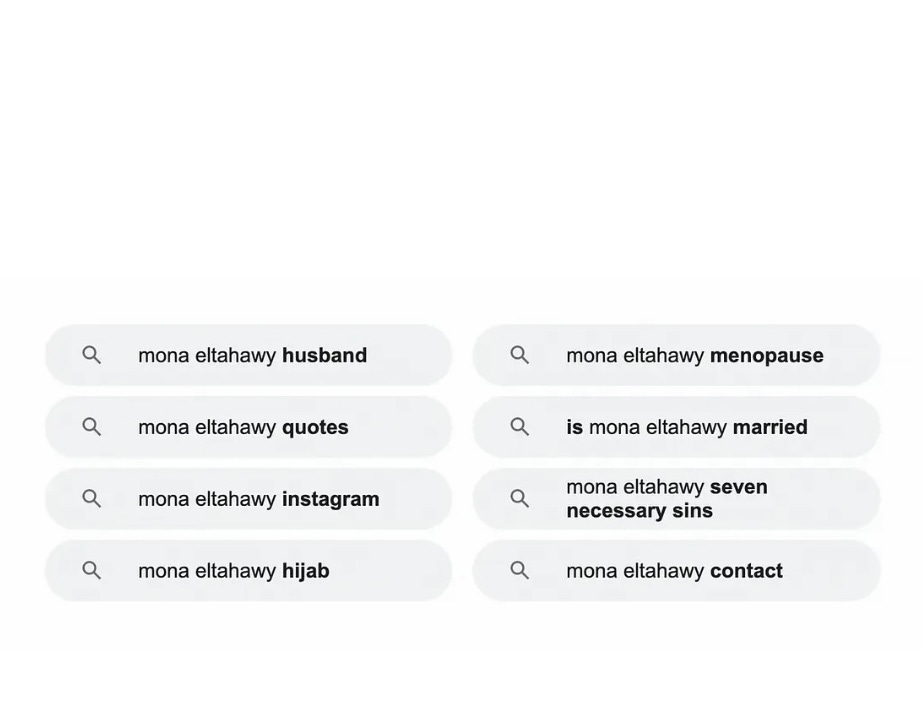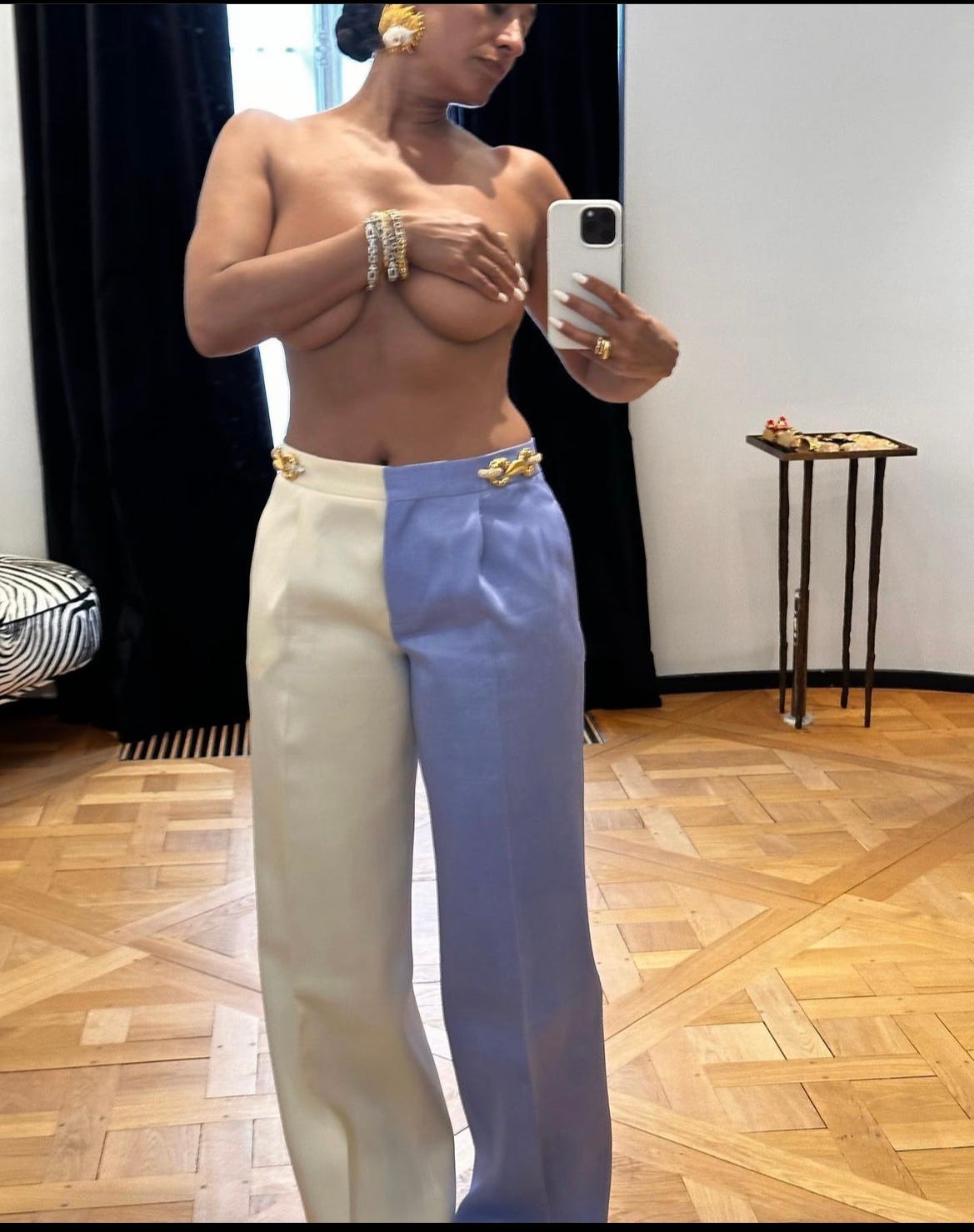Essay: The Trifecta of Patriarchal Fuckery: State, Street, Home.
When you Google my name, the second most popular search is “Mona Eltahawy husband.”
I could flatter myself and say people want to know if I’m “available.” But I’m nonmonogamous so that’s a moot point.
Or that perhaps they want to know who the lucky man is who “got” me.
But I know that the reason the search for “Mona Eltahawy husband” is so popular is because the people who are looking for my husband are looking for the man who should be “controlling me,” “reining me in,”and “putting me in my place.”
Please pay attention to all those words in “-” because they are the reason I’m writing this essay.
Women’s bodies are vectors; the canvas upon which patriarchy encourages men to engrave their stories. When the most powerful institutions in the country show you how little regard they have for our bodily autonomy, even the weakest of men will reap those rewards.
Three times in recent weeks, we have seen men very publicly trying to control women, rein them in, and put them in their place. What has made each incident especially audacious is the celebrity status of the women targeted by such behaviour or the ostensibly cool, been-to-therapy persona of a celebrity man dishing out that behaviour.
What makes each of these very public incidents especially dangerous is that they are happening at a time of growing conservatism in the United States at the highest levels–the State–that is sure to green light attempts to control, reign in, and put women in their place in the public level–the Street/Work–and the private level–the Home.
It is why I always say pay attention to the Trifecta of Patriarchy–State, Street, and Home.
When the highest institutions in the land such as the Supreme Court and Congress are controlling women—cis, trans, and effectively everyone who is not a wealthy, able-bodied, conservative Christian, cisgender, heterosexual white man—reining them in, and putting them in their place through laws that curb and control our bodily autonomy, it turbocharges the ways cishet men are socialized to centre their emotional well-being and reputation on how “their women” behave.
I know that the reason the search for “Mona Eltahawy husband” is so popular is because the people who are looking for my husband are looking for the man who should be “controlling me,” “reining me in,”and “putting me in my place.”
Women’s bodies are vectors; the canvas upon which patriarchy encourages men to engrave their stories. When the most powerful institutions in the country show you how little regard they have for our bodily autonomy, even the weakest of men will reap those rewards.
When a celebrity such as Jonah Hill brazenly co-opts the language of therapy to control his then-girlfriend, surfer Sarah Brady, understand that he is modeling ways that ordinary men will feel entitled to similarly use “boundaries” to abuse their girlfriends.
And if you don’t believe me, you must have missed the number of men on social media defending Hill because he ended his texts attempting to dictate who Sarah Brady saw and how she dressed with “it’s your choice.”
When a celebrity such as Keke Palmer is so brazenly humiliated by the father of her baby over a dress she wore and at a time when she had publicly expressed difficulty with her body image after her pregnancy, understand that he is modeling ways that other men will feel entitled to similarly use respectability politics to shame mothers over what they can and cannot wear. And feeling especially entitled to control their wives’ bodies.
And if you don’t believe me, you must have missed the number of men on social media expressing surprise that Keke Palmer was not even Darius Jackson’s wife so why was he telling her what she could and could not wear? Clearly, many people think men can lay down dress codes for their wives.
Men try to control women every day. That is not new. But when the State is so brazenly doing it, understand: it will get worse.
In the year since the Supreme Court of the United States overturned Roe vs Wade, the National Domestic Violence Hotline saw a 99 percent increase in the number of people saying they had endured some kind of what anti-domestic abuse activists call “reproductive coercion,” including being denied an abortion or being forced into one–99 percent increase!
“When you have laws that come along that are now stripping survivors of their bodily autonomy and right to control their own lives and health—which is exactly what abusive partners are trying to do—it is taking the harm even further,” Crystal Justice, chief external affairs officer for the National Domestic Violence Hotline, told VICE.
See that State-Home connection?
Crystal Justice further told VICE that abusive partners now feel “emboldened and justified in their use of reproductive coercion to control the survivor, which in many cases includes survivors being forced to become pregnant.”
Reproductive coercion on the level of the State giving the green light to reproductive coercion in the Home.
“The state is not saying that women have reproductive options…Therefore, as a person who is trying to control another human being, that sends a signal to me that I don’t have to give her those options either,” Elizabeth Tyler-Tobin, a lawyer who serves as an associate professor of health services, policy and practice at the Brown University School of Public Health, told VICE.
What of the Street/Work level of that Trifecta of Patriarchy?
Following the recent Supreme Court ruling ending the practice of affirmative action in college admissions, 13 Republican attorneys general wrote a letter to leaders of Fortune 100 companies Thursday warning them against using race as a factor in hiring and promotion decisions, Obviously, it will be Black and women of colour who will face the brunt of this doubling down, caught as they are between racism and misogyny. And you know it will not stop at Fortune 100 companies.
The workplace is already rife with a minefield of misogyny. A reminder from researchers at Harvard Business Review who are studying the impact of sexism and ageism, which is often referred to as gendered ageism, on professional women: there is no mythical “prime” working age or “sweet spot.”
Similarly, there is no “prime” age or “sweet spot” in the life of a woman to be free of men’s controlling fuckery. Which leads me to the third incident of men trying to control, rein in, and put a woman in her place. It has not been discussed as often or as vociferously as the Jonah Hill texts or Darius Jackson’s tweets about Keke Palmer. But it is, of the three incidents, the closest to my heart and (r)age.
Perhaps because we are both in our fifties, talk often of our menopause transition, and are child as well as husband free, I was most struck by the body shaming flung at Tracee Ellis Ross after she posted a picture of herself wearing only trousers with her arms across her breasts.
Photo via @traceeellisross
I thought of Ellis Ross, especially, when I read Gender Equity Researcher Amy Diehl’s recounting in HBR that search committees declined to hire women in their 50s because they have ‘menopause-related issues and could be challenging to manage.’...Yet the jobs were given to similarly aged men.”
Challenging to manage!
“As they do grow older and more mature in their careers, [women] lose some of the fear of speaking their mind. And certain men don’t like that,” Diehl told HuffPost. “Men will allow women into the workplace ... and will be supportive of women in the workplace to the extent that women are compliant, supportive of the men, and they don’t push back.”
Judging by the reaction to Ellis Ross’s photograph on Instagram, it is in fact, many men who don’t like that.
Unable to take advantage of the power dynamic of a celebrity (Jonah Hill) with a girlfriend in her early twenties, or take advantage of the societal acceptance of humiliating mothers for unmotherly behaviour (Darious Jackson), the men who came for Tracee Ellis Ross decided that the most effective way to control, rein her in, and put her in her place was ageism.
“As they do grow older and more mature in their careers, [women] lose some of the fear of speaking their mind. And certain men don’t like that…Men will allow women into the workplace ... and will be supportive of women in the workplace to the extent that women are compliant, supportive of the men, and they don’t push back,” Amy Diehl
With no man around to control her, to tell her what kind of pictures she could or could not post, to tell her what was and was not appropriate for a woman of her social standing to wear or not to wear, the men of social media stepped in and did it for him. Unable to handle a woman who is handled by no one, they called her a “loser” for so effortlessly and shamelessly posting a picture showing exactly what she wanted to show of her body.
And then I’m sure they googled “Tracee Ellis Ross husband.”
And that is what makes women like Tracee Ellis Ross dangerous–they are ungovernable. And that is why patriarchy tries to convince us we are invisible. Wishful thinking!
The white supremacist Christian conservatives who have pushed to destroy our bodily autonomy will not stop at destroying abortion rights. The growing conservatism they are ushering in will fire up the loop of misogyny that travels back and forth along the Trifecta of Patriarchy.
Expect more fuckery of the Jonah Hill and Darius Jackson variety. And meet it with the danger of Tracee Ellis Ross.
Good luck finding, Mr. Mona!
Mona Eltahawy is a feminist author, commentator and disruptor of patriarchy. She is editing an anthology on menopause called Bloody Hell! And Other Stories: Adventures in Menopause from Across the Personal and Political Spectrum. Her first book Headscarves and Hymens: Why the Middle East Needs a Sexual Revolution (2015) targeted patriarchy in the Middle East and North Africa and her second The Seven Necessary Sins For Women and Girls (2019) took her disruption worldwide. It is now available in Ireland and the UK. Her commentary has appeared in media around the world and she makes video essays and writes a newsletter as FEMINIST GIANT.
FEMINIST GIANT Newsletter will always be free because I want it to be accessible to all. If you choose a paid subscriptions - thank you! I appreciate your support. If you like this piece and you want to further support my writing, you can like/comment below, forward this article to others, get a paid subscription if you don’t already have one or send a gift subscription to someone else today.





Tracee Hope Ellis Ross once told Oprah part of Tracee’s magic is that she pees when she needs to pee. It’s a mantra 🕉️ I repeat to myself every day now throughout my day. It’s a reclamation of my body. The “this work/thing is too important for me to take a break to pee” loop that plays in my head is now replaced with hearing Tracee say “I pee when I feel the need to pee.” This requires me noticing what’s going on in my body, somatic engagement, mindfulness, self compassion, and wisdom all rolled into one. Thank you Mona for this masterpiece of an essay. Thank you Tracee for showing us what it looks like to be free in your fabulous fifties. Love you both. 💛Ida